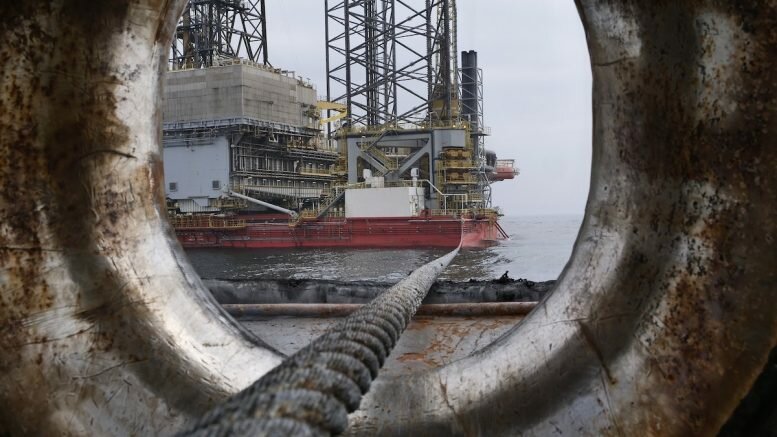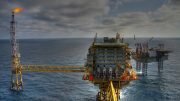Norway’s economy and environment are currently standing toe-to-toe in the country’s Supreme Court.
The Norwegian Constitution asserts each citizen’s right to a healthy environment. However, a large part of Norway’s economy relies on the oil industry.
These two (some say conflicting) factors have led to a Supreme Court hearing.
Climate lawsuit underway
From November 4 to 12, the Supreme Court of Norway will listen to an environmental group-led lawsuit against oil drilling in the Arctic.
The government approved three major oil licenses for companies on June 10, 2016, granting rights for exploratory drilling in the Barents Sea.
Environmental groups hope to invalidate the licenses and stop further oil exploration in the area.
The case is being brought by Nature and Youth Norway and Föreningen Greenpeace Norden vs. The State represented by the Ministry of Petroleum and Energy.
15 Supreme Court judges (a number generally reserved for only the most significant issues) are presiding over the case.
Norway’s oil exploration history
Norway’s oil exploration, and its prosperous economy, have a big stake in the Norwegian Continental Shelf, which encompasses the Norwegian Sea, the Barents Sea, and the North Sea.
Prior to the 1960s there was little interest in the shelf. Then, companies began to inquire about the possibilities of finding oil in the Arctic. They were (and are) willing to pay large sums of money to the Norwegian government for exploration, drilling, and production licenses.
In 1963, Norway capitalized on the arising opportunities and proclaimed sovereignty over the Continental Shelf. This was officially recognized by the UN in 1965.
The rest is history. One of the largest-ever offshore oil fields was discovered on the shelf in 1969 and oil production successfully began in the area in 1971. Since then, Norway has profited from oil heftily.
112 oil fields have been drilled on the Continental Shelf since 1971. At the end of 2019, the area had 87 active oil fields. 2 were recorded in the Barents Sea, 19 in the Norwegian Sea, and 66 in the North Sea, with further plans for production underway.
One of the main target expansion areas for the oil industry is the least-exploited Barents Sea. Oil production began comparatively recently here; the government approved exploration in the sea in 2013.
The World Wildlife Fund (WWF) states that the “Barents Sea is one of Europe’s last large, clean and relatively undisturbed marine ecosystems.” WWF highlights the importance of keeping it oil exploitation-free.
This is one of the reasons the new lawsuit is focused on the three new licenses granted to the Barents Sea, in particular.
Three grounds of prosecution
The suing environmental groups argue their case on three main grounds.
#1: “Every person has the right to an environment that is conducive to health…”
First, the prosecution claims the licenses are at odds with Article 112 of the Norwegian Constitution, which reads:
“Every person has the right to an environment that is conducive to health and to a natural environment whose productivity and diversity are maintained. Natural resources shall be managed on the basis of comprehensive long-term considerations which will safeguard this right for future generations as well.
In order to safeguard their right in accordance with the foregoing paragraph, citizens are entitled to information on the state of the natural environment and on the effects of any encroachment on nature that is planned or carried out.
The authorities of the state shall take measures for the implementation of these principles.“
Environmental groups hold that oil productions violates human rights outlined in the Constitution, claiming it’s detrimental to a healthy environment.
So, the prosecution is suing not only for present, but also for future generations whose right to a healthy environment could be infringed upon.
The Norwegian government, on the other hand, claims to have fulfilled its constitutional duty. It points out that the oil industry in Norway is subject to environmental regulations.
#2: “Every human being has the right to life…”
Second, the environmental groups hold that the licenses violate the right to life itself, arguing that they can lead to the loss of life through, for example, pollution.
They call upon the following: Article 2 of the European Convention on Human Rights and Article 93 of the Norwegian Constitution, Article 8 of the Convention, and Article 102 of the Constitution:
Article 2 of the European Convention on Human Rights
“1. Everyone’s right to life shall be protected by law. No one shall be deprived of his life intentionally save in the execution of a sentence of a court following his conviction of a crime for which this penalty is provided by law.
2. Deprivation of life shall not be regarded as inflicted in contravention of this Article when it results from the use of force which is no more than absolutely necessary:
(a) in defense of any person from unlawful violence;
(b) in order to effect a lawful arrest or to prevent the escape of a person lawfully detained;
(c) in action lawfully taken for the purpose of quelling a riot or insurrection.“
Article 93 of the Norwegian Constitution
“Every human being has the right to life. No one may be sentenced to death. No one may be subjected to torture or other inhuman or degrading treatment or punishment. No one shall be held in slavery or required to perform forced labor. The authorities of the State shall protect the right to life and oppose torture, slavery, forced labor and other forms of inhuman or degrading treatment.”
Article 8 of the European Convention on Human Rights
“1. Everyone has the right to respect for his private and family life, his home and his correspondence.
2. There shall be no interference by a public authority with the exercise of this right except such as is in accordance with the law and is necessary in a democratic society in the interests of national security, public safety or the economic well-being of the country, for the prevention of disorder or crime, for the protection of health or morals, or for the protection of the rights and freedoms of others.“
Article 102 of the Norwegian Constitution
“Everyone has the right to the respect of their privacy and family life, their home and their communication. Search of private homes shall not be made except in criminal cases. The authorities of the state shall ensure the protection of personal integrity.“
#3: Procedural errors in license granting
The litigants’ third and final argument is that oil exploration licenses are downright invalid because of procedural errors.
They claim that companies’ plans were not adequately researched by the government before licenses were approved. Had they been properly inspected, prosecutors argue, the government should never have approved them due to negative effects on the environment.
With this argument, the prosecution attacks not only the licenses granted for the Barents Sea 2016, but also the government’s decision to open the Barents Sea for drilling in the first place in 2013, as well as oil drilling in the Arctic in general.
Support given to environmental groups
Environmental groups leading the case in Norway have received external support, too.
For example, crowdfunding for court costs has raised about $270,000 from donors worldwide.
Influential environmental institutions have submitted official statements to the court in favor of the litigants, too.
These are the Allard K. Lowenstein International Human Rights Clinic of Yale Law School; the Center for International Environmental Law; the Climate Realists; the Environmental Law Alliance Worldwide; the Norwegian National Human Rights Institution; and United Nations Special Rapporteurs for Human Rights and the Environment and for Human Rights and Hazardous Substances and Wastes.
“The beginning of the end of the oil age”?
Andreas Randoy, deputy head of Nature and Youth Norway, stated that this lawsuit “is our generation’s best shot to make sure a significant amount of carbon dioxide stays buried under the ground and never gets burned.”
He continued that winning this case would mean “the beginning of the end of the oil age” in the Arctic.
If the case loses, however, the oil age could continue full speed ahead, with international companies already racing to secure a portion of Arctic oil.
But environmentalists across the world are racing, too.
Environmental groups have been bringing an ever-increasing amount of climate change lawsuits to courts in recent years. And – human rights have been called upon more and more in environmental cases.
Between 2015 and May 2020, 39 lawsuits across the world were brought against corporations and states for human rights violations related to climate change.
Norway and global emission levels
The ongoing case against the Norwegian government could bring to the spotlight Norway’s influence on global emission levels, too. Here’s why.
Norway’s oil and gas industry makes up over 50% of the country’s exports.
In 2018, Norway exported a total of $127 billion.
The exports were led by:
- Petroleum Gas ($37.2 billion)
- Crude Petroleum ($33 billion)
- Refined Petroleum ($6.97 billion )
- Non-fillet Fresh Fish ($6.79 billion)
- Raw Aluminium ($3.29 billion)
These were the most common export destinations:
- United Kingdom ($25.8 billion)
- Germany ($20.2 billion)
- Netherlands ($12.4 billion)
- Sweden ($9.8 billion)
- France ($8.73 billion)
A number of questions might be posed outside of the domestic sphere. Could global pollution levels have risen in part due to oil and gas from Norway’s Continental Shelf? Should oil and gas companies, and the governments that grant them licenses, be held accountable for any proven global effects of their exports?
Before such questions are explored in details, we will likely first see how the climate case Nature and Youth Norway and Föreningen Greenpeace Norden vs. The State represented by the Ministry of Petroleum and Energy progresses on a domestic level.
What are your thoughts on this case?
What future precedents might it set – whichever way it goes?
Let us know in the comments.
Source: Norway Today






Explorations and extractions can always be done with suitable safeguards to marine environments. Considering strict law enforcement and general attitude towards the environment in Norway, it should not be impossible for the Norwegian government to extract natural resources without damaging the marine ecosystem.
The environmentalists are forgetting that their ability to fight for the cause is in fact indirectly funded and supported by the sense of (financial, social, mental, and future) security due to the oil fund itself. Fighting to ban everything seems illogical, far-fetched, and equivalent to putting a stone on your own feet.
A better thing to do would be to ask the government to put in place plans and money to ensure minimum (or close to zero) impact to marine environment.
It is almost absurd to bring in the Right for life! The oil and gas industry are main contributors to a healthier life, all the hospitals machines, tools, medication packaging and more, are the products of oil and gas…Pollution, yes, but how much of that in Norway or Norway contribution to the world, if Norway is exporting pollution, then let them sue the countries receiving the pollution! The right for life is to have a mobile phone, mostly produced thanks to refined oil, and be able to call for a helicopter or ambulance to get medical help! Which in their turn until further development need the oil and gas industry. No one is dying in Norway due to pollution, where are the statistics?! The country has the cleanest air on planet earth, is fully powered by hydroelectric, cars demand is now at 50% electric,….and that was only possible thanks to the oil and gas industry. They have the freedom of choice to live as rudimentary as they wish, and maybe world demand to such life style will choose to follow. Improvement in keeping a healthy environment is what has been happening with hydro and ecars, the Norwegian government has been driving and supporting such improvement. The court case should happen in countries where people have no right to life due to lack of food, nutrition, starvation. Maybe a real humanitarian purpose is to spend the 230k on fighting for those who need help now. Obviously more education is needed around the positive impact of oil and gas to our right to life now and for the generations to come.